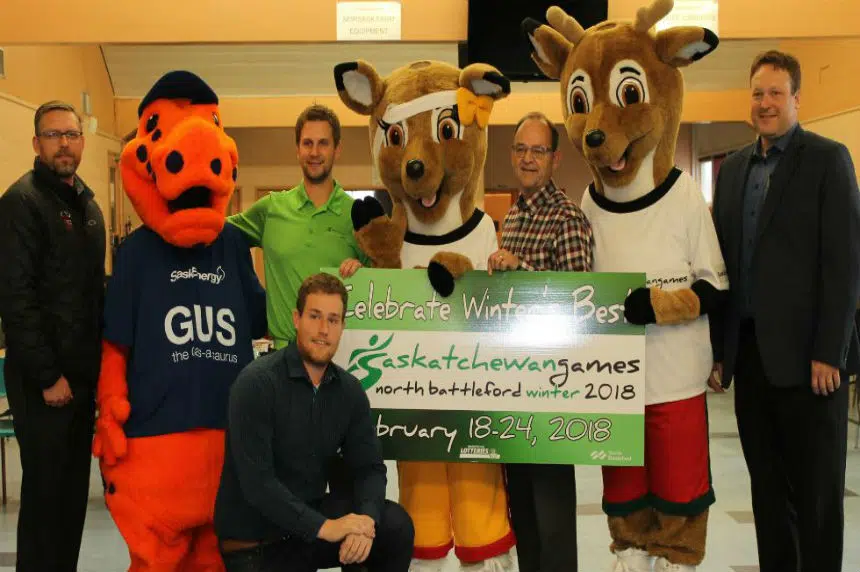In 1974, the city of North Battleford hosted the first ever Saskatchewan Winter Games. Now, 44 years later, the city is ready to kick off the 12th provincial winter games, with the torch relay set for Sunday at 6 p.m., beginning at City Hall.
The goal of the games is to help develop athletes, coaches and officials by giving them the opportunity to participate in a multi-sport event. The experience prepares them for a higher level of competition, such as the Canada Winter Games, or even the Olympics.
The 1,340 athletes range in age from 10-18, hence the focus on development, and each of the 17 sports also has specific age classfications.
The Nine Districts
Ahead of the first provincial games, Regina and Saskatoon were declared ineligible to host as those cities had the ability to host other major events and the committee also wanted to encourage province-wide involvement. While they can’t host, Saskatchewan’s two largest cities unsurprisingly make up the two largest contingents at this year’s Winter Games.
Saskatoon’s 193 registered athletes and Regina’s 187 comprise two of the nine districts competing for the ‘Games Flag,’ awarded to the district that accumulates the most points during competition.
The ‘home’ district, Rivers West, is fielding 182 athletes from the region including the Battlefords, Kindersley, Lloydminster, and Meadow Lake. The North district, by far the smallest with just 47 athletes, includes northern communities such as La Loche, La Ronge, and Buffalo Narrows.
The Lakeland district is sending 153 athletes to the games from the Prince Albert, Melfort, and Tisdale area. Coming from south of Lakeland are the 158 athletes of the Prairie Central district, which includes Humboldt, Warman, and Wynyard. To the east of Prairie Central is Parkland Valley, which is sending 120 athletes from the region including Yorkton, Melville and Kamsack.
The final two districts are South East (150 athletes) and South West (150 athletes). South East includes Estevan and Weyburn, while South West includes Assiniboia, Moose Jaw, and Swift Current.
The 17 Sports: where and when
The Saskwatchewan Winter Games featires both traditional winter sports like skiing, snowboarding, curling and figure skating, as well as indoor sports that aren’t traditionally associated with winter such as table tennis, badminton, five-pin bowling, judo, gymnastics, and synchronized swimming.
With over 1,300 athletes set to compete in the 17 different sports, there will be non-stop action throughout next week. Half of the sports begin on Monday and run until Wednesday, while the other half begin Thursday and run until Saturday.
Alpine skiing, biathlon, men’s curling, gymnastics, men’s hockey, judo, speed skating, synchronized swimming, target shooting, and weightlifting all begin Monday, Feb. 19. Badminton, bowling, cross-country skiing, women’s curling, figure skating, women’s hockey, snowboarding, table tennis and wrestling all kick off Thursday, Feb. 22.
The CuPlex will be by far the busiest place throughout the games. Badminton, gymnastics, and judo will all take place at the NationsWest Fieldhouse, while the Dekker Centre will host weightlifting, the Coop Aquatic Centre will host synchronized swimming, and the Northland Power Curling Centre will (obviously) host curling. Alpine skiing and snowboarding will take place at Table Mountain, while biathlon and cross-country skiing will take place at Blue Mountain.
The Civic Centre will host men’s hockey and figure skating, and Battleford Arena hosts women’s hockey and speed skating. Don Ross Arena will also host some of the hockey action, while the Don Ross Gymnasium is home to wrestling.
Table tennis and target shooting will be held at the John Paul II Collegiate gym, and Gutters Bowling Centre will host the bowling events.
North Battleford Comprehensive High School will serve as the athlete’s village, providing the comforts of home to athletes, coaches and officials.
A detailed schedule of events can be found online.
Past Results
During the most recent Winter Games, hosted by Prince Albert in 2014, Regina won the ‘Games Flag’ with 180 points, while Saskatoon was second with 161 and Lakeland was a close third with 157. Regina has taken the flag and bragging rights at four consecutive winter games, coming out on top in 2002 in Humboldt, 2006 in Melfort, and 2010 in Moose Jaw.
Between them, Regina and Saskatoon have won the flag at nine of the 11 past Winter Games. Prince Albert/Melfort was the only other contingent to win, finishing first at the 1994 Winter Games in Kindersley and again at the 1998 Winter Games in Nipawin.







